Old Testament Law Collection (11 vols.)
Digital Logos Edition
Overview
Are some sins more serious than others? What does the Bible says about connecting punishments with crimes? Do the portions of law in the Bible constitute merely moral advice? Or are they the legitimate basis for modern legal theory?
The 11-volume Old Testament Law Collection explores the endless connection between Old Testament texts and conceptions of law. Many of the legal texts in the Bible serve as the basis for the origins of Western law and civilization. They are models from which Reformation and Enlightenment political theory are drawn. These texts are integral for how we understand covenant theology, how we interpret large swaths of the Pentateuch, and how we formulate modern conceptions of justice. This collection will benefit anyone interested in understanding Old Testament law—especially the legal texts in the Pentateuch—and it will provide clarity for anyone seeking to understand law within the context of theology.
With the Logos Bible Software edition, all Scripture references are linked to the Hebrew texts and English Bibles in your library. By employing the advanced search features in Logos, you can find the exact topics, Scripture references, and subjects you’re looking for. Search across the entire collection for the text you’re preaching on next Sunday, or explore subjects related to your next small group or Bible study gathering.

- Studies of law in the Israelite monarchy
- Explanation of clean and unclean rituals
- Careful examination of the practice of justice in ancient Israel
- All Scripture references linked to the Bibles in your library
- Title: Old Testament Law Collection (11 vols.)
- Publisher: Sheffield Academic Press
- Volumes: 11
- Pages: 2,772
This title is included in the following collections
You can save when you purchase this product as part of a collection.
Logos 8 Messianic Jewish Diamo...
$2,999.99$2,999.99Logos 9 Messianic Jewish Diamo...
$2,999.99$2,999.99Library of Hebrew Bible/Old Te...
$4,999.99$3,749.99Verbum 8 Portfolio Legacy Libr...
$4,749.99$4,749.99
- $4,749.99
- $7,749.99
- $11,399.99
- $11,399.99
- $21,749.99
- $23,999.99
- $24,999.99
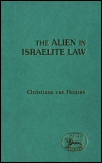
One of the first systematic and critical reconstructions of the history of the social class of aliens in ancient society, this study develops new insights gained from the sociological approach to biblical literature. As Israel developed from tribal society to state, from state to confessional community and from confessional community to province, the identity and legal status of the alien developed in a concomitant way. Laws which initially afforded the alien only partial social and cultic inclusion in the pre-exilic period eventually required complete equality between the alien and Israelite in the postexilic period.
Christiana van Houten is professor of religion at Calvin College.
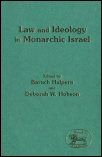
Three major essays by Baruch Halpern, Brian Peckham and Paul E. Dion deal with traumatic changes in Israelite culture, in particular the transition from the traditional culture of Israel in Iron Age IIA (tenth–ninth centuries) to a new, more widely literate culture in the 7th seventh centuries BCE. These essays throw into relief changes in legal, political and religious culture in Judah in the last 150 years of its independence. Their combined implications for the origins of Western law and civilization, and for the models from which Reformation and Enlightenment political theory were drawn, are substantial.
Baruch Halpern is Director of Jewish Studies Program at Pennsylvania State University, Chair in Jewish Studies, Professor of Ancient History, Mediterranean Studies and Religious Studies and Fellow of the Institute for the Arts and Humanistic Studies.
Brian Peckham was professor of Bible and Ancient Near East at the University of Toronto.
Deborah Hobson is Vice-President for Admissions, York University, Toronto.
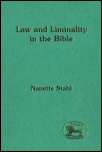
Liminal moments in biblical narrative are moments of transition and change, which are typically fraught with ambivalence. Such new beginnings enshrine both hope and doubt for the future, as in the account of the rebuilding of life after the Flood (Genesis 9). In this subtle analysis, Stahl observes how frequently one component of these liminal moments is law, offering as it does stability and order in a chaotic world but also resonating with the ambiguities inherent in the narrative history. In the Bible, law as well as narrative is multi-voiced.
Nanette Stahl is Judaica Curator at Yale University Library, New Haven, Connecticut.
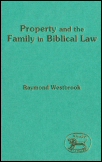
Biblical property law was concerned less with the efficient use and transfer of commercial assets than with protecting the rights of the family to the sources of their economic survival. This important survey explores the legal link between property and family in the Bible, whether through the general law of inheritance or through special institutions such as redemption, the levirate and the sabbatical and jubilee years. It brings together the author's existing contributions, previously published in disparate law journals, to which have been added several unpublished studies and a general introduction.
Raymond Westbrook was Professor of Near Eastern Studies at Johns Hopkins University.
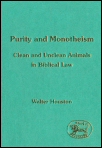
The distinction between clean and unclean animals, probably originating in tensions between shepherds and farmers, is transformed into an important theological principle in the biblical laws of Leviticus 11 and Deuteronomy 14. In this wide-ranging and elegantly written study, Houston argues that the avoidance of “unclean” foods is a mark of the exclusive devotion of Israel to one god. In a concluding chapter, it is suggested that the abolition of the distinction in early Christianity corresponds to the universal horizon of the new faith.
Walter J. Houston is Fellow Emeritus at Mansfield College, University of Oxford, and Honorary Research Fellow in the Department of Religions and Theology at the University of Manchester, UK. He is a contributor to the Oxford Bible Commentary and Eerdmans Bible Commentary.
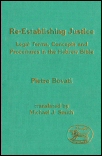
In this very significant work, translated from the Italian, Bovati examines in careful detail the practice of justice in ancient Israel, first the bilateral controversy (the rib), and then the legal judgment properly speaking. Re-establishing Justice is destined to become the standard reference work in the field. The contents deal with:
- The juridical dispute in general
- The accusation
- The response of the accused
- The reconciliation
- Judgment in court
- The acts and procedures preceding the debate
- The debate
- The sentence and execution
Pietro Bovati is Professor of Exegesis of the Old Testament at the Pontifical Biblical Institute in Rome
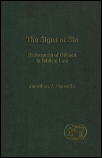
What makes one crime more serious than another, and why? This book investigates the problem of "seriousness of offence" in English law from the comparative perspective of biblical law. Burnside takes a semiotic approach to show how biblical conceptions of seriousness are synthesized and communicated through various descriptive and performative registers. Seven case studies show that biblical law discriminates between the seriousness of different offences and between the relative seriousness of the same offence when committed by different people or when performed in different ways. Recurring elements include location and the offender's social statue. The closing chapter considers some of the implications for the current debate about crime and punishment.
Jonathan Burnside is lecturer in Criminal Law at the University of Bristol, UK.
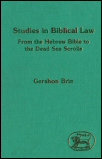
In this volume, Gershon Brin examines the development of biblical law, suggesting that it may be due to different authors with different legal outlooks, or that the differing policies were required in response to different social needs. Biblical laws appearing in the Dead Sea Scrolls literature are treated in a separate unit. Study of this subject can shed light both on the biblical laws as such, as well as on the manner of their reworking by the Judean Desert sect. Brin also discusses questions of the style, the idea, and the historical and ideological background underlying the reworking of these laws in Qumran. The second part of the book presents a comprehensive picture of the issues involved in the laws of the first-born, a subject that has legal, social and religious implications.
Gershon Brin is Professor of Biblical Studies at Tel Aviv University.
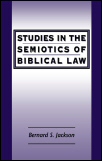
This book explains and illustrates a variety of semiotic issues in the study of biblical law. Commencing with a review of relevant literature in linguistics, philosophy, semiotics and psychology, it examines biblical law in terms of its users, its medium and its message. It criticizes our use of the notion of literal meaning at the level of both words and sentences, preferring to see meaning constructed by the narrative images that the language evokes. These images may come from either social experience or cultural narratives. Speech performance is important, both in the negotiation of the law and the narratives of its communication. Non-linguistic semiotic phenomena, utilizing other senses and involving such notions as space and time, also need to be taken into account. For the early biblical period, at least, conceptions of law based upon modern models need to be replaced by the notion of 'wisdom-laws'. Amongst the issues addressed in the course of the argument are the structure of the Decalogue, the role in the law of postulates, covenant renewal, and punishment.
Bernard Jackson is Alliance Professor of Modern Jewish Studies, Centre for Jewish Studies, University of Manchester.
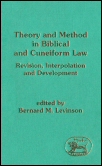
The essays in this volume focus on two crucial topics that have been given short shrift in the contemporary debate on the composition and formation of the Pentateuch: biblical law, and the development of Israelite legal institutions; and the significance of ancient Near Eastern law for developing a proper model for the composition and editorial history of the Pentateuch.
To correct the imbalance, the focus of this volume is on whether the biblical and cuneiform legal corpora underwent a process of literary revision and interpolation that reflects legal, social, and theological development. If so, what is the nature of this development and the evidence for it? If not, how are the textual phenomena otherwise to be explained? The contributors are Raymond Westbrook, Bernard M. Levinson, Samuel Greengus, Martin Buss, Sophie Lafont, Victor H. Matthews, William Morrow, Dale Patrick, and Eckart Otto. The volume will be of interest to students and specialists in biblical law, pentateuchal studies, and comparative legal history.
Contributions to this volume include:
- “What is the Covenant Code?” Bernard M. Levinson
- “The Case for Revision and Interpolation within the Biblical Legal Corpora,” Bernard M. Levinson
- “Some Issues Relating to the Comparability of Laws and the Coherence of the Legal Tradition,” Samuel Greengus
- “Legal Science and Legislation,” Martin J. Buss
- “Ancient Near Eastern Laws: Continuity and Pluralism,” Sophie Lafont
- “The Anthropology of Slavery in the Covenant Code,” Victor H. Matthews
- “A Generic Discrepancy in the Covenant Code,” William Morrow
- “Who is the Evolutionist?” Dale Patrick
- “Aspects of Legal Reforms and Reformulations in Ancient Cuneiform and Israelite Law,” Eckart Ott
Bernard Levinson holds the Berman Family Chair of Jewish Studies and Hebrew Bible, Department of Classical and Near Eastern Studies, University of Minnesota, Minneapolis, USA.
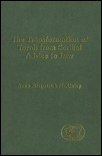
Recent discussion of biblical law sees it either as a response to socio-economic factors or as an intellectual tradition. In either case it is viewed as the product of elites that form an international community drawing on a common culture. This book takes that fundamental discussion a step further by proposing that “law” is an inappropriate term for the biblical codes, and that they represent, rather, the “moral advice” of scribes working independently of the legal framework and appealing to Yahweh as authority. Only by prolonged exegesis and through the transformation of Judean religion does this “advice” take the form of divine law binding on Jews.
Anne Fitzpatrick-McKinley is Lecturer in Old Testament in the Department of Hebrew, Biblical and Theological Studies, Trinity College, Dublin.